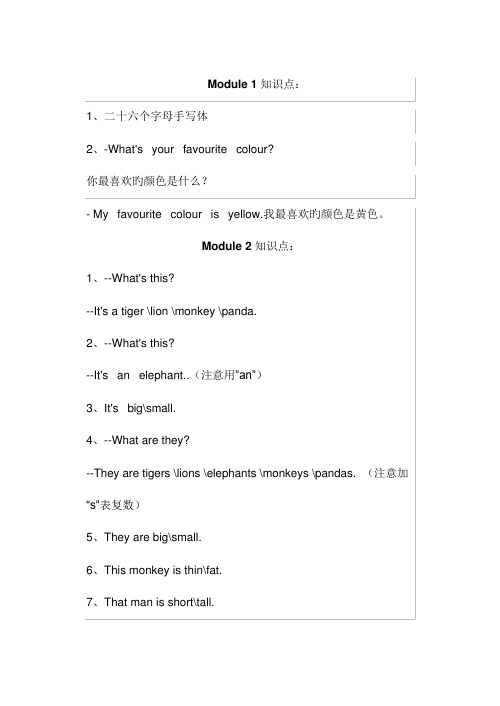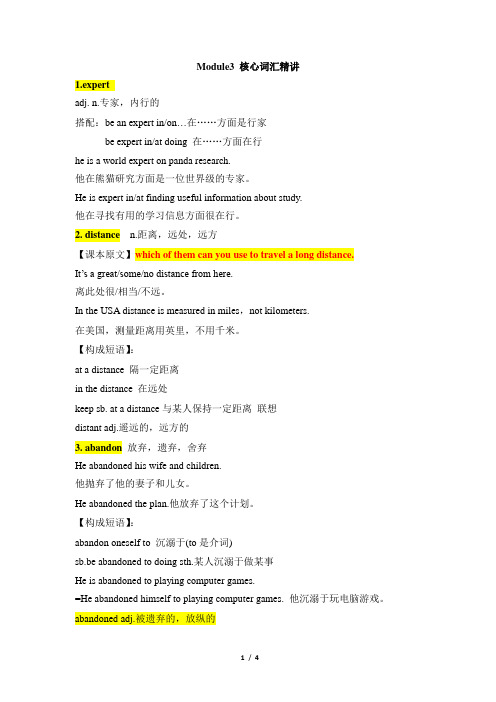Module 3要点知识提炼
外研版三年级英语下册全册知识要点综合复习资料

外研版三年级英语下册全册知识要点综合复习资料外研版三年级英语下册全册知识要点综合复习资料【 Module 1 】1. -What ’ s your favourite colour ?你最喜欢的颜色是什么?-My favourite colour is yellow. 我最喜欢的颜色是黄色。
colour 颜色 :(red 、 blue 、black 、 white 、 green 、 orange 、 brown)2. -What ’ s your favourite song? 你最喜欢的歌曲是什么?-It ’ s the ABC song. 是字母歌。
3. -Here you are. 给你。
-Thank you. 谢谢。
【 Module 2 】1. -What ’ s this? 这是什么? -It ’ s a tiger . 这是一只老虎。
animal 动物 :(monkey 、 lion 、 panda 、 an elephant 、 cat 、 dog)2. -What are they ?它们是什么? -They ’ re tigers . 它们是老虎。
(monkeys 、lions 、 pandas 、 elephants)3. That man is short. 那个男人很矮。
It is big and tall . 它又大又高。
(tall 、 short 、 big 、 small 、fat 、 thin)【 Module 3 】1. I like football . 我喜欢足球。
sport 运动:(morning exercises 、 table tennis 、basketball)I don ’ t like football . 我不喜欢足球。
sport 运动 :(swimming 、skipping 、 riding my bike)【 Module 4 】1. -Do you like meat ? 你喜欢肉吗? -Yes, I do. /No, I don ’ t. food 食物:(meat 、rice 、fish 、milk 、noodles) fruit 水果 :(pears 、 bananas 、 oranges 、 apples)2.-Does Sam like pears ?萨姆喜欢梨吗? -Yes, he does. /No, he doesn ’ t.-Does Amy like pears ? 埃米喜欢梨吗 ? -Yes, she does. /No, she doesn ’ t. food 食物 :(meat 、 rice 、 fish 、 milk 、 noodles ) fruit 水果 :(pears 、bananas 、oranges 、 apples)3. -Pass me the rice, please! 请递给我米饭。
牛津英语模块三unit3知识小结

牛津英语模块三u n i t3知识小结(总6页)-CAL-FENGHAI.-(YICAI)-Company One1-CAL-本页仅作为文档封面,使用请直接删除重点短语be in use 在使用中 set sail for 去航去by the time 到......时候 lead to 导致as early as 早在 in the future将来take over 接管,接任,控制 lost civilization失落的文明in memory of 纪念 in return for 作为。
的回报carry out实施,执行,进行 no more不再be off to 出发去 too...to 太...而不能pour out 涌出,倾泻 attend a lecture去听演讲more than 多于, 不仅仅 be buried alive被活埋be covered with被。
覆盖 be known aseither ... or 或者。
或者 neither ... nor 既不。
也不not only ...but also不但。
而且 it turns out that 结果证明是/ 原来on board在船上,飞机上或火车上 in good condition处于良好的状态prevent sb. from sth/ doing sth 阻止某人做某事 cut down 砍到declare war against 向。
宣传 together with 和。
在一起dig ...for treasure挖...找财宝 be involved in 参与,与...有关联result in 导致 take ... as an example 以...为例Be considered to be... 被认为是 have the chance to do sth 有机会做of great value 具有很大的价值take 相关短语take over 夺取,接管,控制,管理,继承 take away _________ take off_______ take up__________ take time to do sth ____________ take charge of __________ put 相关短语put out发表,发布,熄灭,出版 put off ___________ put on _____________put up___________ put up with__________put 相关短语come to达到某种情况或状态 come to oneself 苏醒 when it comes to谈到...涉及.. come across ___________ come up with __________ come out__________1.集中于2.对……有影响3. 受够了某人4. 阻碍(某人)5. 患病Come的相关短语:流传,降落:come 找到解决办法:come发生: come 发芽,出版:come偶遇: come 总计:come6. 实施,进行7. 阻碍(某人)8. 起义,反抗 9. 研究……10. 与……有关11. 无疑,确实翻译:毫无疑问他会成功词类转换decorate (vt.) 装潢、装饰→ ________ (n.) 装潢、装饰declare (vt.) 宣布,宣称→ _________ (n.)宣布,宣称,宣言educate (vt.) 教育→ ________ (n.) 教育→ ________ (n.) 教育者complain (vi.) 抱怨→ ________ (n.) 抱怨corrupt (vt.) 使腐败,使堕落(adj.)贪污的,腐败的→ ________ (n.) 贪污,腐败erupt (vi) (火山等)迸发,喷发,喷出,爆发→ __________ (n.) 爆发aware (adj.) 意识的,察觉到的→ __________ (n.)意识,认识historical (adj.) 历史的,与历史研究相关的→ ________ (n.)历史powerful (adj.) 强有力的→ ________ (n.) 权利wealthy (adj.) 富有的,富裕的→ ________ (n.) 财富,钱财cultural (adj.) 文化的→ ________ adv.)文化上地→ ________(n.) 文化extreme (adj.) 极度的,极端的→ ________ (adv.) 极其,极端fortunate (adj.) 不幸的,运气不好的→ __________(adj.) 幸运的,侥幸的→________ (adv.) 幸运地,侥幸地gradually (adv.) 逐渐地→ ________ (adj.) 逐渐的remains (n.) 遗迹→ ________ (vi.) 留下,剩下→ ________ (adj.) 剩余的judge (n.) 法官,审判者,裁判员→ ________ (n.) 审判,判决poison (n.) 毒药,毒物;(vt.)毒害,下毒→________ (n.) 中毒→________ (adj.) 有毒的solution (n.) 解决办法,解答→ ________ (v.) 解决,解答expression (n.) 表达,表情,神色→ ________ (v.) 表达sailor (n.) 水手,海员→ ________ (v.& n.) 航行basis (n.) 基础,基准,原因→ ________ (vt.& n.)基地,以.......为基地1. (n.) 表达;表情→(v.)表现,表达2.(adj.)强有力的,强大的→ (n.) 权力,势力3.(adj.)幸运的→(adj.)不幸的,运气不好的→(adv.)幸运地4.(vt.)宣布;宣称→ (n.) 宣言声明支持/反对5.(adj.)纪念的,记忆的→ (n.)记忆力,记忆→(v.)记忆纪念 in of;类似结构的短语:希望:in of 需要:in of搜寻:in of 支持:in of以防万一:in of 就……而言:in of6. (v.)教育,教导→ (n.)教育;培养→ (n.)教育家7. (n.) 荣耀,光荣→(adj.)光荣的;荣耀的8. (adj.)知道的,意识到的→(adj.)不知道的→(n.)知道,意识* 提高……意识9. (vt.)使腐败→(adj.)→(n.)腐败10. (n.)毒物,毒药→(vt.)毒害→(adj.)有毒的,有害的11. (vt.)判断,评价→ (n.)法官→ (n.) 判断语法填空A British club arranged for high school students to go on a cultural tour of places where there are lost civilizations. Ann felt 1 (luck) to have the chance 2_______ (visit) Pompeii in Italy and Loulan in China.On Day 1, Ann arrived in Italy. On Day 2, Ann attended a lecture about Pompeiiand gained the knowledge of the city, which was founded in the 8th century BC but 3________ (bury) underground after the volcano near the city erupted in AD 79. OnDay 3, Ann visited the ancient Roman city of Pompeii, 4_______ was discovered inthe 18th century but was much damaged because 5_______ people’s digging beforeit got protected by the government in 1860.On Day 10, Ann arrived in Loulan. She was filled with 6 _________ (excite) to bein Loulan, which was a stopping point on the famous Silk Road but was 7________ (gradual) covered over by sandstorms from AD200 to AD 400. On Day 11, Professor Zhang, a scholar from the local cultural institute, told 8_______ the discovery of Loulan---- an explorer from Europe 9_______ (call) Sven Hedin discovered the ruinsof the Loulan Kingdom around 1900. The desert was once a green land with huge trees, but they were cut down, 10_______ (cause) the city being buried by sand.Ancient Greek statue found in XingjiangA small statue of a Greek soldier was found in Xingjiang, which 1. (explain) as a result of Alexander the Great’s influence.Alexander 2. (succeed) his father to the throne when he was twenty. Thenhe led an army and took back many Greek cities3. didn’t obey him.From 334BC, Alexander took his army into the Middle East, Egypt, and thenIndia, and won every battle. He occupied more land than anyone 4. when he was thirty. Unfortunately, he died5. a fever when he was around thirty-three.Alexander had a deep influence on the world by 6. (spread) Greek culturefrom Europe to Africa and Asia.The father of Western philosophyPhilosophy is a way of looking at the world around us, or of answering the great questions of life.Socrates was the father of Western philosophy. He came from Athens, Greece and lived to the age of 70. He once worked 7. a solider, a teacher and a worker. Western thought and science have been 8. (deep) influenced by him.Socrates taught his students by asking questions to challenge them 9. develop and explain their own 10. (argue). His way of approaching the truth is now 11. (call) the Socratic Method.However, Socrates’s way of questioning everyone made many people upset, and finally he 12. (take) to court and put to death.。
Module3Myschool教案讲解+精选精练

一、教学内容
《Module 3 My school》为本章节的教学内容,选自人教版新目标英语Go for it!七年级上册。主要内容包括:
1.词汇:介绍学校场所的词汇,如classroom, library, gym, playground等。
2.句型:学习描述学校设施和位置的句型,例如:
(3)语法:掌握一般现在时的用法,用于描述学校的现状和规律。
-举例:能够正确使用一般现在时表达学校日常活动,如“We have seven classes a day.”
2.教学难点
(1)词汇拼写的正确性:学生容易混淆相似词汇的拼写,如classroom与class的区分,library与libary的误拼等。
(三)实践活动(用时10分钟)
1.分组讨论:学生们将分成若干小组,每组讨论一个与学校介绍相关的实际问题,如如何描述学校的位置和特点。
2.实验操作:为了加深理解,我们将进行一个模拟介绍学校的活动。这个活动将演示如何运用所学词汇和句型。
3.成果展示:每个小组将向全班展示他们的讨论成果和模拟介绍的结果。
(四)学生小组讨论(用时10分钟)
- This is my school.
- The library is next to the gym.
- We have seven classrooms in our school.
3.对话:通过对话展示如何介绍学校及其设施,如:
- A: What's your school like?
- B: It's big and nice. We have a big playground and a library.
2023年外研版小学英语三年级下册全册知识要点

Module 1知识点:1、二十六个字母手写体2、-What's your favourite colour?你最喜欢旳颜色是什么?- My favourite colour is yellow.我最喜欢旳颜色是黄色。
Module 2知识点:1、--What's this?--It's a tiger \lion \monkey \panda.2、--What's this?--It's an elephant..(注意用”an”)3、It's big\small.4、--What are they?--They are tigers \lions \elephants \monkeys \pandas. (注意加“s”表复数)5、They are big\small.6、This monkey is thin\fat.7、That man is short\tall.Module 3知识点:1、I like football\basketball\table tennis\morning exercises.2、I don't like swimming\riding bikes\skipping.3、--Do you like football?--Yes, I do. --No, I don't.1)说“我喜欢……”用句子“I like…”2) 说“我不喜欢……”用句子“I don't like…”3)问“你喜欢……吗?”用句子“Do you like…?”喜欢旳话,回答“Yes, I do.”不喜欢旳话,回答“No, I don't ”Module 4知识点:1、--Do you like rice\noodles\meat\fish?--Yes, I do. --No, I don't.2、--Does Daming like bananas\oranges\apples?--Yes, he does. --No, he doesn't.*********************************1)第三人称单数(简称“三单”)意思为“tā”,包括he、she、称呼和名字。
外研版(三起)五年级下册英语Module3大单元说课

大单元教学下的整合教学设计说课——以外研社(三起)五年级下册Module3为例一、模块教材分析本模块是外研社新标准英语(三年级起点)五年级下册第三模块的学习内容,属于“人与自我”范畴,主题是“English food”。
第一单元的课文情境是Daming 告诉Fanfan他收到了Lingling 的电子邮件,由此展开Lingling 一日三餐的情况。
第二单元的课文是Amy写给Daming的一封信。
Amy告诉Daming ,今天Sam在学校吃了四个汉堡包。
话题内容与学段教学内容分别与饮食、食物都有关联,在谈论一日三餐的基础上,进一步谈论中西方饮食习惯的差异。
本模块意图让学生运用一般过去时的特殊疑问句及答语来询问和表达一日三餐都吃了什么,了解掌握相关的英国传统食物名称,引导学生了解最有益于健康、最科学的饮食结构,养成良好的饮食习惯。
本模块继续巩固一般过去时的运用,教师可以引导学生进一步归纳、总结动词过去时的形式。
本模块的任务是在小组内调查学生一日三餐的情况,选出“健康饮食小达人。
”1.模块教学内容横向关联模块单元Module 1 Unit1 We lived in a small house.Unit2 She didn’t have a television.Module2 Unit1 She learnt English.Unit2 Mr Li was a teacher.Module3 Unit1 She had eggs and sausages.Unit2 Sam ate four hamburgers.Module6 Unit1 I went there last year.Unit2 She visited the Tianchi LakeModule9 Unit1 We laughed a lot.Unit2 Mum bought new T-shirt for you.学段模块及单元题目话题功能三年级下册Modul4 Unit1 Do you like meat? 谈论对事物的喜爱四年级上册Modul4 Unit1 Do you like some rice? 谈论是否想要吃某种事物五年级上册Module6 Unit1 What did you buy? 谈论超市购物及食物的数量二、学生学情分析1.知识储备学生已经有了两年的学习基础,有了一定的词汇量,对一般过去时有了基础的认知。
外研版高中英语必修1 Module3__核心词汇精讲

Module3 核心词汇精讲1.expertadj. n.专家,内行的搭配:be an expert in/on…在……方面是行家be expert in/at doing 在……方面在行he is a world expert on panda research.他在熊猫研究方面是一位世界级的专家。
He is expert in/at finding useful information about study.他在寻找有用的学习信息方面很在行。
2. distance n.距离,远处,远方【课本原文】which of them can you use to travel a long distance.It’s a great/some/no distance from here.离此处很/相当/不远。
In the USA distance is measured in miles,not kilometers.在美国,测量距离用英里,不用千米。
【构成短语】:at a distance 隔一定距离in the distance 在远处keep sb. at a distance与某人保持一定距离联想distant adj.遥远的,远方的3. abandon放弃,遗弃,舍弃He abandoned his wife and children.他拋弃了他的妻子和儿女。
He abandoned the plan.他放弃了这个计划。
【构成短语】:abandon oneself to 沉溺于(to是介词)sb.be abandoned to doing sth.某人沉溺于做某事He is abandoned to playing computer games.=He abandoned himself to playing computer games. 他沉溺于玩电脑游戏。
abandoned adj.被遗弃的,放纵的We saw abandoned farms which were built more than 100 years ago. 我们看到了建于100多年前被遗弃的农场。
Module3Heroes复习教案2024
2.文化意识:通过了解不同领域的英雄人物,学生能够增进对多元文化的理解和尊重,培养国际视野。
-能够理解并尊重不同文化背景下的英雄观。
-能够从英雄事迹中体会到积极向上、勇于奉献的精神。
3.思维品质:通过分析英雄人物的事迹,学生能够培养批判性思维和创新性思维,形成自己的价值观。
在实践活动环节,分组讨论和角色扮演得到了学生们的积极响应。他们能够在小组合作中发挥自己的优势,共同完成任务。但同时,我也注意到有些学生在讨论中较为沉默,可能是因为语言表达能力不足或是对话题不感兴趣。针对这一问题,我计划在接下来的教学中,更多地关注这些学生,鼓励他们积极参与,提高他们的自信心。
关于学生小组讨论环节,我发现学生们对于英雄在不同领域的表现有很深的见解,能够提出许多有趣的观点。但在引导讨论时,我意识到需要更好地把握讨论的方向,确保学生们在讨论过程中能够紧扣主题,避免偏离教学内容。
Module 3 Heroes复习教案2024
一、教学内容
Module 3 Heroes复习教案2024
本节课我们将复习人教版英语九年级下册Module 3 Heroes的内容。主要内容包括:
1. Unit 1 She trained hard, so she became a great player.
-了解并讨论奥运会英雄的故事。
本节课将帮助学生巩固所学知识,提高语言运用能力,激发他们对英雄精神的思考。
二、核心素养目标
Module 3 Heroes复习教案2024
1.语言能力:通过复习本模块,学生能够准确运用一般过去时、现在进行时、现在完成时等时态描述英雄事迹,提升语言表达的准确性和丰富性。
-能够运用所学词汇和句型复述课文故事。
module3单词讲解
account n. 描述,报道,帐户
1. She gave him a full account of her conversation with the doctor.
2. The two accounts of the accident do not agree.
3. I would like to have a personal account to keep my Biblioteka ocket money. In
the back of the garden, a little dog was tied to a trunk. The thief was brought in with his hands tied behind his back. The match ended in a tie finally.
教材原句: We stayed inside the shelter we had built and let the raft down the river. (湖北高考改编)Some parents are just too protective. They want to________ their kids from every kind of danger, real or imagined. shelter 动词词义辨析。shelter意为“保 护,庇护”
1. have connection with 和……有关系 in connection with 关于, 有关, 和……有关 be connected with 与……有联系, 有关 The police are interviewing two men in connection with the robbery. 警方正在查问与劫案有关的两个人。
外研版英语六年级下册Module 3词汇详解课件
【例句】There are some cows on the farm. 农场里有一些奶牛。
【联想】pig 猪 dog 狗 duck 鸭子 sheep 绵羊
【联想记忆】cow
milk
奶牛
牛奶
学法指导 2022版义务教育新课标要求学生有更多 的词汇储存,要重视学生要扩大词汇量,掌 握词汇在不同情境中的用法,因此,讲解词 汇重点句型时,要结合例句,让学生去体会 其一词多义,发展学生的语言思维和运用能 力。同时,多表扬、勤鼓励,使不同层次的 学生都有学习积极性,在知识上均有所提高, 提高英语学习核心素养。
且请看看这只鸟。 【其他词义】刚才,方才;正好;只是
词汇详解
v.(动词) 吹,刮
【发音】ow 发
【短语】blow out 吹灭
【例句】The wind is blowing. 风正在吹。
【变换字母记忆】
slow s改为b 慢的
blow 吹,刮
词汇详解
n.(名词) 奶牛
【发音】ow 发
【形近词】now 现在 how 如何,怎样
外研版·六年级下册
Module 3
词汇详解课件
词汇详解
v.(动词)哭
【发音】y 发 【第三人称单数形式】cries 【动词-ing形式】crying 【过去式】cried 【形近词】try 试,尝试 dry 干的 【例句】My brother is crying.
我弟弟正在哭。 【对比记忆】 cry哭 laugh笑
词汇详解
v.(动词) (太阳)发光,
照耀
【发音】i 发
【第三人称单数形式】shines
【动词-ing形式】shining
【过去式】shined/shone
六上Module3袁
Module 3 Health一、教学内容分析This module is about health. In unit 5, Jiamin is not feeling well. Ben and Janet ask him how he feels and gives advice to him to get well again. Unit 5 is a passage about how Mr Li, who is 80 years old, stays healthy二、教学目标(一)语言知识目标1.词汇health, matter, ill, stomachache, ate, hear, hour, gave, take, medicine, time, toothache, candy, brush, twice, broken, finger, rest, wore, headache, cold, fever, secret, simple, least, diet, less, oily, finally, smile, even. maybe, went, careful, fell2.动词短语sorry to hear…, twice a day, at least, keep a good diet, take a rest, have a cold,3.句型1) What’s the matter with you ?及其回答。
2) The secret to good health.3) You should/ shouldn’t….(二)语言技能目标1.能够按“四会”和“三会”的要求运用本模块的单词及词组。
2.能正确理解课文意思及用正确的语音语调流利地朗读课文,并能听、读与课文类似的对话和短文。
3.能用英语谈论疾病及健康生活的方式。
4.能总结介词的用法。
5.学习如何设计海报。
- 1、下载文档前请自行甄别文档内容的完整性,平台不提供额外的编辑、内容补充、找答案等附加服务。
- 2、"仅部分预览"的文档,不可在线预览部分如存在完整性等问题,可反馈申请退款(可完整预览的文档不适用该条件!)。
- 3、如文档侵犯您的权益,请联系客服反馈,我们会尽快为您处理(人工客服工作时间:9:00-18:30)。
1 / 1
天仁集团 版权所有 禁止转载 http://www.trgroup.com.cn
Module 3要点知识提炼
1. What is food to one man may be poison to another.
【重点知识】 what引导主语从句,作may be 的主语。例如:
What we should do first is to raise money.
【拓展知识】 能够引导主语从句的除了what,还有who, whose, whether, whoever, whatever,
which, whichever, when, where, wherever, why, how等。
2. To my surprise, more dishes arrived, plus soups, side dishes, and desserts.
【重点知识】 to my surprise“令我吃惊的是”为介词短语作状语,也叫插入语,引起后面
的话题,常用逗号分开。例如:
To their surprise, the one they saw was not the actor, but her husband.
【拓展知识】 用于该结构的名词除surprise外还有joy, delight, disappointment, sadness, horror,
fright等。
3. The first time I saw a three-year-old kid cheerfully chewing a chicken’s head I had bad dreams
for weeks.
【重点知识】 chewing chicken’s head为现在分词短语作宾语补足语。在英语中感官动词后
可以接现在分词作宾补,表示动作正在进行。这类动词有: see, watch, notice, observe, look at,
listen to, hear, feel 等。例如:
We heard her singing in her room.
【拓展知识】 see, watch, notice, observe, look at, listen to, hear, feel 等感官动词后也可使用不
带to 的不定式作宾语补足语,强调动作的结果,表示动作的全过程。
4. He must have thought I was joking.
【重点知识】 must have done表示对过去动作的肯定推测,常译作“一定做了……”,只能
用于肯定句中。其否定形式为can’t / couldn’t have done。例如:
It must have rained last night, for the road was quite muddy.
5. It seemed to be just a bowl of grey liquid and it was only after I had tasted it that I knew it was
actually cooked with mushrooms.
【重点知识】 it was only after I had tasted it that ...为强调句型,其结构为: it is / was + 被强
调部分 + that / who + 其它部分。被强调部分可以是句子的主语、宾语、状语,强调状语时,
连接词用that,若强调部分是“人”作主语或宾语,连接词可以用that / who或whom(宾语
时)。例如:
It was Anne that (who) had a severe heart attack last night.
【拓展知识】 强调句中若强调部分是until引导的状语,应把not一起提前,若强调特殊疑
问词,应将特殊疑问词放在句首,且构成疑问句形式。
